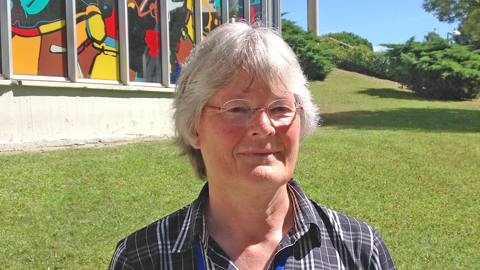"Single mothers integrate better into society than single fathers"

09/08/2016
The "International Conference on Feminist Geographies and Intersectionality: Places, Identities and Knowledges" was held from 14 to 16 July and united some one hundred experts from around the world to analyse gender within the discipline of geography.
Joos Droogleever, lecturer and researcher at the University of Amsterdam and expert in this area, gave a speech at the event. Droogleever is Vice President of the International Geography Union and was head of the Department of Geography, Planning and International Studies Development of the University of Amsterdam from 2008 to 2015.
-The speech you gave at the conference was entitled “Gender and Intersectionality in Geography Teaching”. Tell us a bit about it.
I spoke on how gender and intersectionality is taught in the discipline of geography, in different places. There are differences in the way it is taught, depending on the country and even on the university faculty. Part of my experience comes from years of participating in research projects together with countries such as Denmark, Greece, United Kingdom, Catalonia and the Netherlands. Each year we offer the same course in one country and we see how different cultures teach the subject differently.
Once I worked on a project in which I asked the centre to describe how they designed the subjects on gender and geography for their students. I saw a "continental" way of teaching about gender, which was more formal, with protocols and more emphasis on methodology, while the Anglo-American way of teaching was more informal, focused on theory more than methodology, more open and positioned on the role of the research subject.
-Where is this type of research headed?
I don't think it has to go in any specific direction, I think it is more important for there to be different ways of teaching it and diversity is important. Students must become familiar with the different ways of teaching this.
-Could you explain the concept of “feminist geographies”?
For example, this morning's conference included a talk on the behaviour of women in Jaffa, Israel, and in Barcelona. There were examples on what occurs in traditional and in modern families. Women in public life in both places. The mobility of women in the city compared to men, in their daily lives such as when going to and from home, to work, to school, shopping, etc., seen through geographic and cartographic information systems. This information is very interesting because it allows seeing where they feel safest and if they travel through an area of greater risk, for example.
-You worked on a research project on unemployed single mothers and single fathers living in different parts of Amsterdam. The study reached the conclusion that single mothers were more successful in integrating into society after a period of unemployment than single fathers.
Yes, that is true. It's a research I worked on a long time ago. My most recent studies deal with the elderly. But that study demonstrated that unemployed single fathers have more problems fitting into society than single mothers do. The mothers, even if suffering from economic difficulties, got up early to take their children to school and do other daily routines which made it quicker and easier for them to bounce back. Some even did volunteer work at their children's schools. They actively searched for social networks and were much more integrated into the neighbourhood.
-What does your latest research project deal with?
My most recent project focused on immigrants and native Dutch people in poorer neighbourhoods. In these neighbourhoods, with houses in ruins, immigrants have problems because of their economic situation, not knowing the language and not knowing how the institutions work. But we also see how native Dutch people feel like foreigners in their own town because now stores sell products they are not familiar with, they see the population changing constantly and the neighbourhood physically deteriorating.
-What are the main issues that will be discussed in the 33rd International Geography Conference, which will be celebrated in August in Beijing?
Given that in China physical geography is more important than human geography, the issues will be related to this subject, with the main focus being on sustainability.
-What are the main subjects which need more research in order to improve and introduce the viewpoint of women into our society?
In the future there will be a rise in the importance of international migration, population, an ageing population (soon in Asia, Latin America and Africa), sustainability and ways of being more sustainable, and not only ecologically speaking. At a global level, we see that women earn less than men, even if their education level is the same. Among students the percentage of women is higher, but there are more men in positions of power. That is a reality we see around the world. After graduating, women almost automatically earn less money and many of them are single and mothers. Although it is true that there are single fathers who care for their children, proportionally there are very few of them. A single mother is better connected to society and can thrive better than a single father.